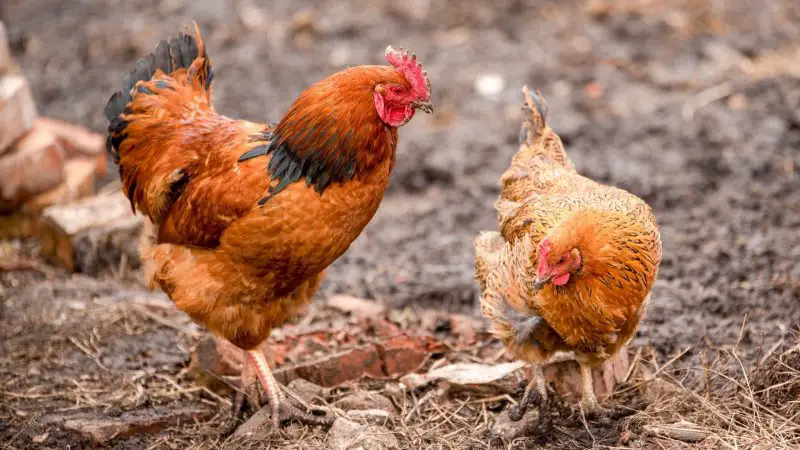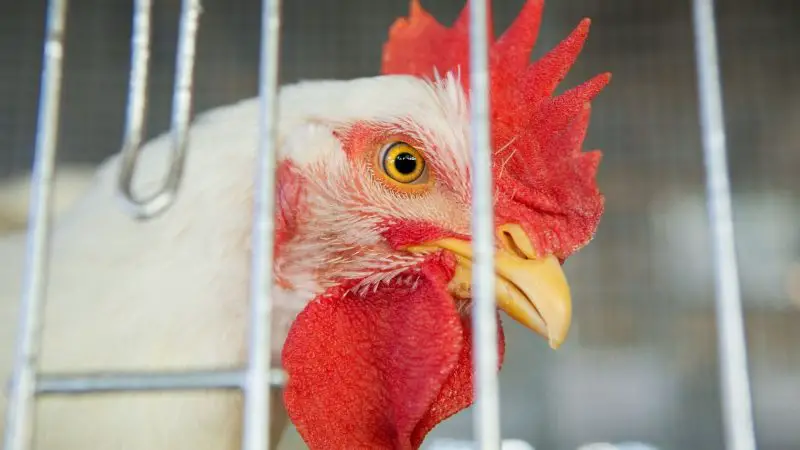Chickens can eat many things. They’re like composters, and you can feed them virtually every type of food waste.
Can chickens eat chicken? Chickens can eat chicken. However, this doesn’t mean you should feed them with another chicken or chicken eggs. Doing so can inspire cannibalism of other birds in your flock. Chicken cannibalism can be very dangerous, and it is tough to reverse once it begins.
In this article, we will cover what chickens can eat and also some tips and tricks on how to deal with chicken cannibalism when it happens.
What Can Chickens Eat?

Chickens can eat many things, including vegetables, fruits, grains, meat, dairy, and basically anything that humans consume. That doesn’t mean that chickens should be fed just about anything; some food better for them than other.
Chickens are a great way to dispose of your food waste, and food scraps are a great treat for your birds! You can keep a bowl on your counter to collect scraps in and then just offer them to your chickens. However, it’s essential to ensure they are not fed anything toxic.
Good Things for Chickens To Eat
They can eat almost all vegetables, fruits, dairy, and different types of meat. Chickens will clean up, rinds and all! It’s impressive how fast a flock of chickens can pick over the food you put in their pens.
You can also give chickens whole melons as a treat. They will peck at the melon and eat the fruit along with the seeds. The only thing they might leave behind would be the peel!
Bad Things for Chickens To Eat
Most birds will not eat things that make them sick, but you need to ensure that you aren’t giving them stuff that is dangerous. Never give your birds anything moldy.
Chickens shouldn’t be given scraps from members of the allium family, like garlic or onions. These are types of bulbs, and you should also avoid giving those to your birds. Don’t plant bulbs near your chicken pen.
It would be best if you also avoid sugary treats. While this isn’t actively toxic, it can lead to digestive issues and other illnesses. If you put sweets out with your birds, save that for special occasions and always in moderation.
One of the biggest things you should keep out of your pens is chicken; cooked, raw, or eggs. If they get the taste of these proteins, there is the chance that your flock could become cannibalistic.
Chicken Cannibalism

Chicken cannibalism is a situation where your flock begins turning on each other and eating eggs or one another. This can progress quickly, so it’s crucial to handle it before birds get hurt or all egg production becomes useless.
A mixture of conditions causes cannibalism and the lower levels of this behavior. These can be stress, cramped and unpleasant pens, inadequate diet, and new birds introduced to the flock.
You need to think about three important things when preparing for this issue:
- Preparation
- Prevention
- Treatment
Each of these will keep your birds safe and make your life easier.
Preparation
Knowing the breed behaviors will help your birds stay happy and healthy.
Stress is the number one cause of pecking and cannibalism in chickens. If you aren’t giving your birds adequate room and feed, they could turn on each other.
Prevention
If you have done your research, you can prevent cannibalism from ever developing. These are some tips to prevent it:
- Remove eggs from nesting boxes promptly. The longer eggs stay in the boxes, the longer the chickens have to get curious and peck at them.
Here is a video to stop your chickens from consuming their eggs:
- Avoid giving your chickens chicken meat, raw or cooked. This may give your birds the taste for flesh and encourage them to become curious if they peck a flock mate.
- Make sure your birds have a good living space. If you need to move your birds, slowly begin the acclimation process and be consistent.
- The living space shouldn’t have too much light or be too hot. It should have evenly spaced feeders and waterers. A good environment will keep your birds happy, and happier birds are less likely to hurt each other.
- You should have 2 sq ft (0.19 sq. m) per adult bird and only need 1 sq ft (0.09 m) for Bantam breeds. This amount of space should be more than enough to keep your birds happy.
- You should also keep all food and water accessible at all times. If the food and water are put out only at certain times, birds lower in the pecking order may never eat.
- You should also have some ways to keep your birds entertained. This can be hay, melons on a rope, fresh vegetables, and all kinds of other DIY tricks.
- Mirrors may also be a great way to keep your birds entertained, but they can also lead to jealousy issues later. It’s best to use mirrors sparingly or remove them promptly.
- Letting your birds safely roam outside is also a great way to give them a place to explore. Observe them, so no predators take advantage of their time out to snag a bird. If possible, let them range in a covered area so that hawks have no chance to attack them.
Treatment

There are ways you can handle chicken cannibalism before it reaches the stage where birds may get hurt. Some solutions are simple; others are harder. All of them are worth doing to save your flock, such as the following:
- If you notice your flock attacking one bird in particular, you should separate the victim from the rest and ensure the bird receives medical attention. Keep an eye on the bird for any signs of infections.
- Most of the time, the victim will be a sick or injured bird. Their frailness will make them an easy target for the flock to attack. They will lose their place in the pecking order and may never recover from that.
- It would help if you kept injured or older birds away from the others as much as possible. If necessary, remove them from the pen and give them medical attention.
- There are salves and balms you can use to treat surface-level wounds, but a vet should look at anything more serious. Treat injuries as soon as they appear.
- Other balms and sprays can stop birds from pecking each other. These mixtures make an unpleasant taste and will make the culprit very uncomfortable. With enough time, they should leave the victim birds alone.
- If symptoms continue to progress, you should separate all of your birds from each other and dim their living area. Darkness can help your birds settle and become more comfortable.
- Make sure your birds have cooled down. Give them time to heal and grow back all their feathers before you place them together again. This will prevent future pecking or tugging on loose feathers.
